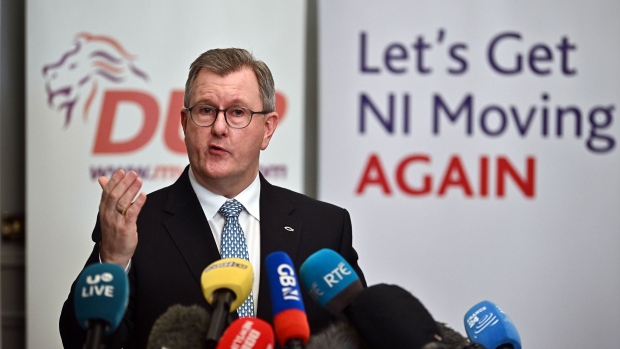Jan 30, 2024
Sunak to Visit N. Ireland After DUP Agrees to End Brexit Impasse
, Bloomberg News

(Bloomberg) -- The UK government is working to close a deal with Northern Ireland’s Democratic Unionist Party after it agreed to end its two-year boycott of the region’s power-sharing government over post-Brexit trading rules.
Northern Ireland Secretary Chris Heaton-Harris will hold meetings with political parties and said the government will on Wednesday publish details of the package of incentives it offered the DUP to end its protest, including a £3.3 billion ($4.2 billion) funding boost. A meeting Tuesday between the DUP, Sinn Fein, Alliance and the Ulster Unionist Party at Stormont Castle, east of Belfast, broke up without setting a date for re-forming the assembly and government.
DUP leader Jeffrey Donaldson has spent the time since the overnight breakthrough with his party talking up the concessions he had won from Prime Minister Rishi Sunak’s government. That reflects the fact that while he has pledged to return to power-sharing, he still faces criticism from inside and outside the DUP who see the protest over Brexit rules as a key chance to reaffirm unionist red lines on sovereignty.
“Those who said there will be no legal change, who were predicting things would fall short, I simply asked people to wait and see,” Donaldson told reporters outside Stormont. “Wait and see the evidence and judge for yourself what this deal does, what it delivers, the change that it secures.”
The DUP withdrew from the power-sharing government in February 2022, arguing the Brexit deal then Prime Minister Boris Johnson signed with the European Union undermined Northern Ireland’s place in the UK. What angered many unionists was the effective border in the Irish Sea, which kept Northern Ireland in the EU’s single market for goods, even after the rest of the UK left.
Unionist hardliners have spent months pressuring Donaldson not to return to government if Brexit rules remained. Protesters gathered at Monday’s DUP meeting, which was held outside Belfast to allow for private deliberations. Still, there were moments of chaos as details were leaked on social media.
Donaldson said the UK has promised legislation “designed to affirm” the region’s place in the UK, and that there would be no checks on goods traveling between Northern Ireland and Britain. “What we’ve secured represents real change,” he told reporters.
But the UK will not publish the deal until Wednesday, and Heaton-Harris said the offer will not need a renegotiation of trading rules agreed with the EU. That raises the risk that Donaldson’s critics could still balk at what he’s agreed.
“I have some worries and they mainly relate to the overselling of the agreement,” said Katy Hayward, professor of political sociology at Queens University Belfast. “Those are very big claims and it is difficult to see how they could be true,” she said, adding that she “could see the themes of this fraying quite early on, particularly being exposed by a general election.”
Other political parties said the next few days will be key. “If it unravels it will be down to lack of political will,” said Alliance Party leader Naomi Long.
Sunak and the EU agreed to tweak post-Brexit trading rules last year to try to make them less disruptive. But the DUP said the changes didn’t go far enough then, meaning there’s significant pressure on Donaldson to show that what he’s agreed now will be good enough to keep his party onside.
Heaton-Harris’s visit to the region suggests the UK government is optimistic that the impasse is coming to an end. The prime minister spoke to his Irish counterpart Leo Varadkar to set out the outline of the deal before the secretary of state left for Belfast.
The premier will be relieved because the political vacuum in Northern Ireland drew attention to the unfinished issues around Brexit. Yet it’s not risk free — Brexiteers will be poring over the deal to ensure Sunak hasn’t done anything that would limit what they regard as the UK’s freedom to diverge from EU rules.
Ending the political impasse would be a significant moment in the history of Northern Ireland, which will get its first nationalist First Minister in Sinn Fein’s Michelle O’Neill. The implications could be far-reaching, given polls in the Republic of Ireland also suggest Sinn Fein is on course to form the government there in an election that could come as soon as this year.
It “signals a new Ireland emerging,” Sinn Fein leader Mary Lou McDonald told reporters at Stormont, standing alongside O’Neill. Northern Ireland’s “electoral majority for unionism has gone.”
Those comments illustrate the wider political backdrop to the DUP’s protest, which critics said reflected its unwillingness to share power in a government that would reflect the region’s shifting political dynamics so clearly.
Donaldson said Sinn Fein’s strength should serve as a warning to his critics: “I hope that from a unionist point of view, we are learning the lessons that divisions in unionism — especially at election time — do not win unionist seats.”
--With assistance from Joe Mayes.
(Updates with UK to publish offer in second paragraph. An earlier version of this story was corrected to show Heaton-Harris, not Sunak, is traveling to Belfast in first paragraph.)
©2024 Bloomberg L.P.








